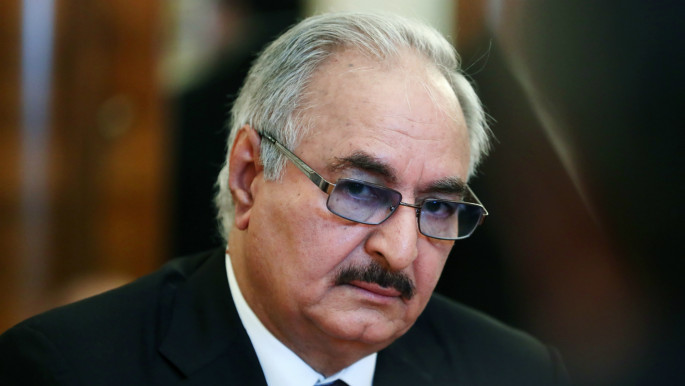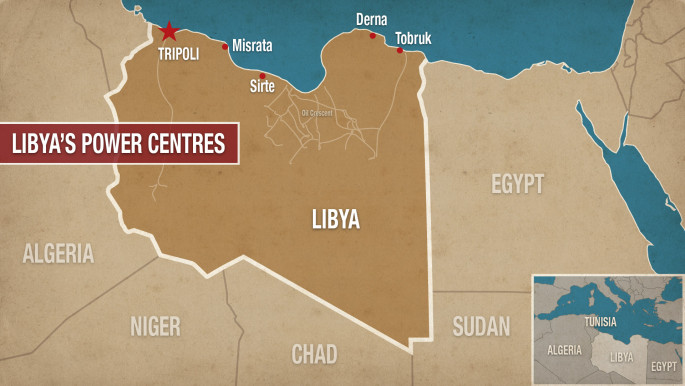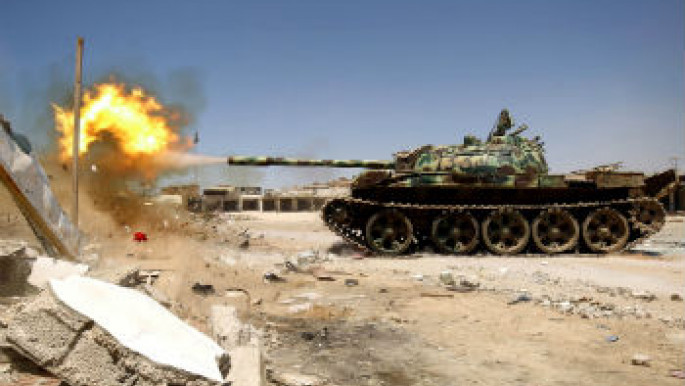Who is Khalifa Haftar, Libya's CIA-linked rogue general-turned-warlord?
Khalifa Haftar, a former leader in Muammar Gaddafi's military who took control of much of eastern Libya with the support of Russia, Egypt and the UAE in the country's ongoing civil war, has launched a fresh offensive on Tripoli, Libya's internationally recognised capital.
It marks a significant turnaround for a man who just a year ago was rumoured to have died following a stroke.
In April 2018, Haftar was flown to Paris for medical treatment; a luxury not afforded to the many who have died under his military campaigns.
Serving in the Libyan army having arrived at Benghazi military academy aged 18, Haftar was part of the cadre that brought Muammar Gaddafi to power in a 1969 military coup.
Haftar was just 26 when he helped Gaddafi overthrow King Idris and became a member of Libya's Revolutionary Command Council. He led Libyan troops supporting Egyptian soldiers in their bid to re-take Sinai from the Israelis during the 1973 war, and became Gaddafi's military chief of staff.
Nearly 20 years of loyal service after the coup, and having been promoted to colonel, he was captured as a prisoner of war in Chad - and denounced by a Gaddafi worried by Haftar's now-growing popularity among everyday Libyans.
Betrayed, Haftar planned to overthrow the Libyan leader.
 |
|
| Haftar spent years living in the United States, and was thought to have cultivated close relationships with US intelligence agencies during the Gaddafi era [Getty] |
After a US-brokered deal to secure his release, he founded a militia based in Zaire (now the Democratic Republic of the Congo), committed to Gaddafi's demise.
In 1990, under a CIA-sponsored deal with Kenya, Haftar moved to the United States, where he and hundreds of his paramilitary soldiers received citizenship. Haftar lived near the agency's headquarters and maintained close relations with several of the US intelligence services.
He proceeded to support several attempts to oust Gaddafi, notably in the 1996 uprising in the Jabal Akhdar mountains of eastern Libya.
His self-styled "Libyan National Army" was described by The Washington Post at the time as "a contra-style group based in the United States".
A decade and a half later, as the Arab Spring gained momentum, Haftar became a senior figure in the forces that finally toppled Gaddafi.
Not universally popular in Libya, he survived a 2014 assassination attempt - though that did force him to lay low for a while thereafter.
Having been close to the United States for years, he subsequently partnered with Russia to receive arms for his cause. He went on to cosy up with the UAE and Egypt, whose air forces would later become crucial in his campaign to seize Libyan territory. He was also hosted by French President Emmanuel Macron, who was trying to make diplomatic headway in 2017 after France air-dropped weapons to rebels fighting Gaddafi in 2011.
What happened in Libya?
The General National Congress was the Islamist-led elected body ruling Libya for two years following Gaddafi's death. After its 18-month deadline to form a new constitution passed in January 2014, the body unilaterally resolved to extend its own mandate.
Haftar called on the GNC to disband. That May, Haftar led troops against Islamist militias in Benghazi and the GNC in Tripoli in an offensive named Operation Dignity.
Amid the chaos, an election was held to form the House of Representatives, which took power from the GNC that August. With rival militias ruling Libya's streets, the election turnout was just 18 percent. Islamist militias then launched Operation Libya Dawn to fight Haftar's troops.
 |
With the lack of security in the capital, the Haftar-supported House of Representatives hired a Greek car ferry harboured in the eastern city of Tobruk as a temporary legislature.
In late August 2014, a group of GNC members reconvened in Tripoli and claimed legislative authority over the country, effectively replacing the House of Representatives as Libya's parliament. The Tobruk-based House of Representatives remained the internationally recognised government, though its actual authority on the ground in Libya was limited.
 |
|
| Haftar's army has been well equipped in its war against the UN-recognised government [AFP] |
Libya's Supreme Court, based in Islamist-held Tripoli, ruled that November that the formation of the House of Representatives was unconstitutional, legally dissolving the Tobruk-based legislature and nullifying its decisions.
The Tobruk-based parliament refused to accept the court's ruling, saying it was made "at gunpoint".
Libya became torn between the rival parliaments and the heavily armed militias that support each. Allegiances between the militias changed frequently, which only added to the instability, violence and danger faced by ordinary Libyan citizens.
Efforts by the UN to establish a "unity government" led to a third administration, this one led by Fayez Sarraj, claiming overall political legitimacy for the country and setting up shop in Tripoli in late March 2016. International legitimacy was bestowed upon it, though it too was unable to claim control over Libya's vast territory.
For the following few years, the UN-supported Unity Government controlled much of Western Libya, while the Haftar-supported Tobruk Government controlled much of the country's east.
Now, in April 2019, the UN-backed government clings on pockets of territory surrounding several of the north-west's major power centres including Zawarah, Zawiyah, Aziziyah, Tripoli, Bani Walid and Misrata - but Haftar's LNA has advanced along the coast and has taken Sirte and most of the rest of the country. The southern fringes remain in the control of a variety of tribal groups and militias.
Both main sides in the civil war are propped up by an array of warlords, militias and criminal gangs. While most of the international community at large supports the Tripoli-based Unity Government, Haftar's forces in the east have the backing of Russia, the UAE and Egypt - which have used their air forces to support Haftar's fighters on the ground.
Much of the country remains lawless; a haven for human traffickers, drug smugglers and banditry - and, as always, Libyan civilians have had to pay the price for the warmongering of powerful men.
Follow us on Twitter: @The_NewArab




 Follow the Middle East's top stories in English at The New Arab on Google News
Follow the Middle East's top stories in English at The New Arab on Google News


